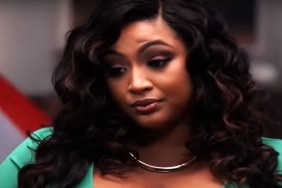Cast:
Kimberly Elise as Crystal / Brown
Janet Jackson as Jo / Red
Loretta Devine as Juanita / Green
Thandie Newton as Tangie / Orange
Anika Noni Rose as Yasmine / Yellow
Kerry Washington as Kelly / Blue
Tessa Thompson as Nyla / Purple
Phylicia Rashad as Gilda
Whoopi Goldberg as Alice / White
Macy Gray as Rose
Michael Ealy as Beau Willie
Omari Hardwick as Carl
Richard Lawson as Frank
Hill Harper as Donald
Khalil Kain as Bill
Rayna Tharani as Renee
Jaycee Williams as Kenya
Thomas ‘Deuce’ Jessup as Kwame
Directed by Tyler Perry
Story:
Nine New York City women from different backgrounds deal with the difficulties in their lives and how to cope with some of the issues they face as women.
Analysis:
As much as you want to give Tyler Perry the benefit of the doubt that maybe he’d be better at adapting someone else’s work than showcasing his own, it’s pretty obvious by the end of “For Colored Girls” that the best thing going for it are the performances of Ntozake Shange’s words by Perry’s infinitely talented cast. The story and characters he’s created to tie all of the women together rarely do justice to those performances.
As the film begins, we meet roughly half the characters living in a Harlem apartment building where everyone is in each other’s business, the primary focus of energy being Kimberly Elise’s Crystal, a mother of two who is constantly being beaten by her shell-shocked war vet husband. Across the hall lives Thandie Newton’s Tangie, a feisty and promiscuous young woman who is bringing home and sleeping with a different man every night. In the apartment in between is Phylicia Rashad’s nosy neighbor Gilda who is constantly judging one and silently praying for the other. Tangie’s mother, played by Whoopi Goldberg, lives in the building downstairs, a religious fanatic looking to save her teenage daughter Nyla, played by Tessa Thompson, from a similar fate. Nyla gets herself pregnant forcing her to get an abortion from a drunken woman in a back alley, played by singer Macy Gray. Crystal also works for a tough boss, played by Janet Jackson, clearly channeling Meryl Streep’s character in “The Devil Wears Prada” (itself based on Vogue editor Anna Wintour), a powerful woman having problems with her husband who is always disappearing on her. (If you can’t figure out what’s going on there than you’re not paying attention to the clues Perry hits the viewer over the head with.) Much of the story is seen through the eyes of a caseworker played by Kerry Washington, who stops by the building to check in on Crystal’s situation and invariably gets pulled into some of the other stories.
Obviously, that’s a lot of characters and stories and like with “Crash” and the many films inspired by it, they’re all running into each other and being connected together. You can generally guess where most of the stories are going, and in the hands of a more capable director, the transitions may have been handled more fluidly than they are here. It’s far too evident from the weight put into every scene that Perry was influenced by the kudos given to Lee Daniels’ “Precious” and wanted to try to inspire his fanbase with something as serious and dramatic without having the material to make it work.
Having Shande’s poetry stirring emotions helps greatly, and when the actresses are performing their own monologues, it’s when the movie shines because they are all powerful moments indeed, but other scenes are plagued by some ridiculously over-the-top performances. So you go from these moments of extreme drama to these powerful monologues, but like with musical and Shakespeare adaptations, the poetry often takes you out of the story. The movie also falters due to the convoluted emotions being thrown at the viewer, while Perry’s attempts at porting the feelings of being a black woman in the ’70s into modern-day women often doesn’t work because the film still feels dated.
One of the standout performances is Loretta Devine, an amazingly talented actress who has never been given as strong a role as the one in this movie as a woman having an affair with a married man who mistreats her, and her Shange-written monologue is certainly the most effective, as is Newton and Goldberg’s dual reading as mother and daughter coming to terms with their differences.
Once again, Perry creates awful caricatures of men in order to villainize them, something that’s most evident in the Anika Noni Rose segment. She plays Nyla’s dance teacher who we meet while she’s on her first date with a handsome, cultured black man who seems to be perfect, but when she invites him over for dinner, he has barely arrived before he starts taking off his clothes (to show his gang tattoos) before brutally raping her on the kitchen floor. (For dramatic effect, the rape scene is intercut with a scene of opera that would make Francis Ford Coppola proud.) Sure, date rape is a very serious offense where someone you trust turns out to be bad, but the scene is handled in such a ridiculous way, that this seemingly kind man could go through such a dramatic change, that it detracts greatly from the seriousness of the issue. Similarly, the entire storyline involving Crystal’s war vet husband and his problems with drinking and violence feels forced due to the overwrought performance by Omari Hardwick.
Maybe Perry’s efforts could be taken more seriously if he made even the slightest effort to include a wider variety of races in his movie because the women’s issues expressed by Shange aren’t ones that only black women have to contend with; Perry could easily have brought in a Latina or Asian actress to show they have the same problems. In fact, there are only two white people in the entire movie, token background actors that you’ll miss if you happen to blink during their appearances. It’s fairly insulting that an Atlanta filmmaker would come to New York City to film a movie and not bother to show even an inkling of the racial diversity of the city, even in Harlem.
It’s hard to gain much pleasure from watching these women being put through some of the most horrifying ordeals–it feels almost sadistic at times–but at least all of them come together at the end for some closure to their various situations, giving a powerful shared reading of the closing poem. By then, you’ve sat through over two hours of meandering storylines where men do horrible things to these women–and we’re including their director among them–so it’s hard for that powerful bonding moment to do much to make up for the pain we’re put through to get to that point.
The Bottom Line:
Women may appreciate the message and sentiments expressed in Shange’s words, but they would have been even more effective if incorporated into a stronger story.










